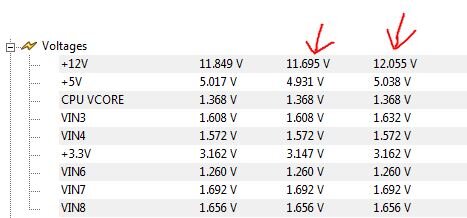- Joined
- Dec 22, 2012
I just wondering if the if these voltages are ok or if something is maybe starting to go?
I have no idea about PSUs, i know the one in my sig is not great, but if its going then i get to upgrade and i now know to do my homework before buying lol (Shiney isn't an indicator of quality
and i now know to do my homework before buying lol (Shiney isn't an indicator of quality )
)
I have no idea about PSUs, i know the one in my sig is not great, but if its going then i get to upgrade
 )
)

